Hryhorii Seleshchuk: ‘The formation of migration policy should be based on deep analysis of the situation’
Friday, 25 May 2012, 22:59 A roundtable on social problems of Ukrainian migration was held on May 15 at the Institute for Regional Studies of the National Academy of Sciences of Ukraine. Nearly 40 leading Ukrainian scientists, public figures, journalists, representatives of the State Migration Service and others participated in the event. The UGCC Commission for Migrants was a co-organizer of the roundtable.
A roundtable on social problems of Ukrainian migration was held on May 15 at the Institute for Regional Studies of the National Academy of Sciences of Ukraine. Nearly 40 leading Ukrainian scientists, public figures, journalists, representatives of the State Migration Service and others participated in the event. The UGCC Commission for Migrants was a co-organizer of the roundtable.
Professor Juliana Sadova (head of humanitarian development of the region of the Institute for Regional Studies of NAS of Ukraine) presented the principles of regional migration policy. Hryhorii Seleshchuk, head of the Commission for Migrants, emphasized that the establishment of regional and state migration policy must be done taking into account the results of scientific research. However, academic achievements should follow from practical activity and meet the objective of the latter.
Zoryana Lukavetska, project manager for Caritas Ukraine, shared her experience of organizing activities for children of migrant workers and stressed that singling out children whose parents are migrant workers is absolutely not acceptable, because it leads to their social stigmatization.
The seminar was also attended by Oksana Sapelyak (Institute of Ethnology), a researcher, who in particular studied the Ukrainian diaspora in Argentina and Paraguay. She stressed that Ukrainian migration lasts for more than a half century and that for some the migration challenges have been resolved. Although these solutions were rejected in Soviet times, she believes nothing prevents us from returning to them now.
Svitlana Miroshnychenko, representative of the State Migration Service in Lviv Oblast, urged the participants disseminate their achievements and academic texts, and share the results of their work with officials, who "need new information about current Ukrainian migration.”
The roundtable ended with a discussion on the causes and consequences of labor migration as well as the about the possibility to reduce its negative consequence. Participants noted the importance of the role of the church in addressing the needs of migrants.
Reported Svitlana Odynets
LATEST NEWS

We can imagine what the prayer of the prisoners in the Russian torture centers in the Ukrainian Kharkiv region was like – Head of the UGCC on the 206th day of the war 17 September
A vast cemetery, a mass burial, was found near the city of Izyum, in which more than 400 innocently killed and tortured people have already been...
-
 Глава УГКЦ у 158-й день війни: «Нехай Господь прийме з уст нашої Церкви псалми та моління за всіх тих, які особливо просять нашої молитви»
Глава УГКЦ у 158-й день війни: «Нехай Господь прийме з уст нашої Церкви псалми та моління за всіх тих, які особливо просять нашої молитви»
-
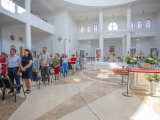 «Сила, яка походить із вірності Христові, є стержнем, який ніхто не може зламати», – Блаженніший Святослав
«Сила, яка походить із вірності Христові, є стержнем, який ніхто не може зламати», – Блаженніший Святослав
-
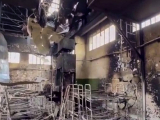 Глава УГКЦ у 157-й день війни: «В ім’я Боже ми засуджуємо звірства в Оленівці і світ повинен це засудити як особливий вияв дикості й жорстокості»
Глава УГКЦ у 157-й день війни: «В ім’я Боже ми засуджуємо звірства в Оленівці і світ повинен це засудити як особливий вияв дикості й жорстокості»
-
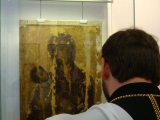 «Боже, почуй наш плач і поспіши нам на допомогу і порятунок!», – Глава УГКЦ у 156-й день війни
«Боже, почуй наш плач і поспіши нам на допомогу і порятунок!», – Глава УГКЦ у 156-й день війни
-
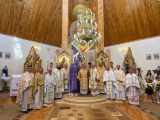 «Бог йому дав серце і душу українського народу»: відбулася щорічна проща до Прилбичів з нагоди уродин митрополита Андрея Шептицького
«Бог йому дав серце і душу українського народу»: відбулася щорічна проща до Прилбичів з нагоди уродин митрополита Андрея Шептицького
-
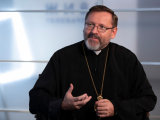 Глава УГКЦ: «Я горджуся українськими патріотами, які без найменшої краплі ненависті готові захищати своє»
Глава УГКЦ: «Я горджуся українськими патріотами, які без найменшої краплі ненависті готові захищати своє»
-
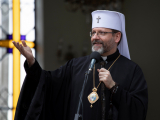 Блаженніший Святослав закликав українську молодь скласти присягу на вірність Христові
Блаженніший Святослав закликав українську молодь скласти присягу на вірність Христові
-
 Глава УГКЦ у 155-й день війни: «Помолімося, щоб не втратити скарбу віри князя Володимира»
Глава УГКЦ у 155-й день війни: «Помолімося, щоб не втратити скарбу віри князя Володимира»
-
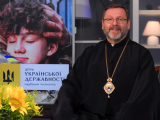 Блаженніший Святослав у День державності України: «Наша Держава – це для нас питання життя або смерті»
Блаженніший Святослав у День державності України: «Наша Держава – це для нас питання життя або смерті»
-
 Глава УГКЦ у 154-й день війни: «Нехай Господь Бог прийме у свої вічні обійми журналістів, які віддали за правду своє життя в Україні»
Глава УГКЦ у 154-й день війни: «Нехай Господь Бог прийме у свої вічні обійми журналістів, які віддали за правду своє життя в Україні»
-
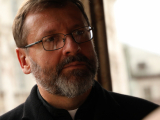 Глава УГКЦ у 153-й день війни: «Принесімо наш біль перед Боже обличчя і будьмо певні, що Він нас вислухає»
Глава УГКЦ у 153-й день війни: «Принесімо наш біль перед Боже обличчя і будьмо певні, що Він нас вислухає»
-
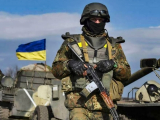 Глава УГКЦ у 152-й день війни: «Помолімся молитву заступництва за наших воїнів»
Глава УГКЦ у 152-й день війни: «Помолімся молитву заступництва за наших воїнів»
-
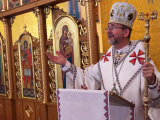 «Віруюча людина не може бути байдужою, коли бачить страждання іншої людини», – владика Богдан Дзюрах
«Віруюча людина не може бути байдужою, коли бачить страждання іншої людини», – владика Богдан Дзюрах
-
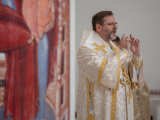 «Серед нашого страждання творімо простір для прояву Божої всемогутності», – Глава УГКЦ у 6-ту неділю після П’ятдесятниці
«Серед нашого страждання творімо простір для прояву Божої всемогутності», – Глава УГКЦ у 6-ту неділю після П’ятдесятниці
-
 Глава УГКЦ у 151-й день війни: «Російське віроломство ми перемагаємо силою любові до нашої Батьківщини»
Глава УГКЦ у 151-й день війни: «Російське віроломство ми перемагаємо силою любові до нашої Батьківщини»

